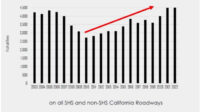Along with a lot of my friends and some of my neighbors, I love politics and I don’t mind getting into long discussions with conservatives or people on the right. Sure we disagree! But so what? It’s been a part of my life for as long I can remember. And I have been a liberal for most of my life and, in the eyes of some, a die-hard lefty. In short, I am quite comfortable being who I am politically.
I have studied Marxism and Communism and found it to be lacking across the board in dealing with the daily lives of people in Communist countries. We live in a free society with a capitalist economic system in which a country’s trade and industry are controlled by private owners, for profit. Over the years, however, there has been a continuing dialogue on how do curb the excesses of our economic system. The unscrupulous and despotic behavior of the powerful robber barons of the gilded age enriched their own pockets through their exploitation of labor. Today we read of mine disasters, ruptured gas lines, exploding trains. Monopolies undermined the free market system by eliminating competition. In a competitive market companies have to appeal to consumers with either lower prices or high quality.
Today consumers have fewer options while prices soar and quality is compromised. Today a 20-year-old hot water heater is replaced by one with a seven-year warranty. Built in (planned) obsolescence is a given. Protecting the consumer has been a contentious issue for centuries, often pitting the haves against the have-nots.
In 19th century Europe Karl Marx saw the inherent abuses of private ownership as a vehicle for a small ruling class to amass great fortunes. He saw the progression of slave ownership beginning with ancient civilizations, feudalism under the rule of monarchs and their landowning aristocracies, and the abuses of the working class during the Industrial Revolution – the sweat shops and the lack of regard for worker safety. In 19th century Europe, he witnessed monarchies transitioning to capitalist economies that perpetuated the conflict between the oppressive, monied ruling class and the working class.
Marxist Communism advanced a philosophy that inevitably the underclasses would revolt and demand an end to this cycle. As Communism advanced in Russia the ‘state’ morphed into the ‘politburo,’ a group of elite members who became the arbitrator of all things, a new ruling class demanding its citizenry conform to the will of the state in all matters. Opposition was not tolerated, death camps proliferated.
Socialism was seen by Marx as step toward a more equitable society. Contrary to popular opinion socialism, which is considered by many to be a front for communism, and capitalism can exist side by side without conflict. For example the UK and Germany both embraced a form of socialism that guarantees certain basic needs for its citizens like healthcare and expanded social welfare programs and both countries have thriving capitalistic economies.
When FDR introduced Social Security in 1935 the response was overwhelmingly negative. It was derided by opponents as being the road that would lead us into a socialist (misleadingly equated to a Soviet Communistic) state. Yet today there are very few seniors who do not rely on their planned retirement programs. Medicare has softened the burden of mushrooming healthcare costs.
In addition to SS and Medicare, in 2003 Congress passed and President Bush signed into law the Medicare Modernization Act which brought Medicare Part D, the prescription drug coverage for seniors on January 1, 2006. Again the government acted to protect and defend seniors from undue loss of personal retirement funds. Interestingly, for the past 79 years we have gratefully accepted programs which when they were introduced were seen by some as “the end to America’s greatness as we know it.” As early as 1961 Ronald Reagan was speaking out against Social Security calling it socialism and believed that Americans would never vote for socialism but if given the opportunity would under the name of liberalism adopt every fragment of the socialist program. However once he won the presidency he did not push for the repeal of Medicare or Social Security.
All labels aside, I have come to believe that unbridled capitalism is not a panacea nor is socialism a front for communism. As a nation, and in so far as socialism exercises some control on the excesses of capitalism, we are a healthier and happier society.
So here we are in December 2014 and the Republican led Congress is promising to repeal the Affordable Care Act for the 51st time even though it has brought health care to nine million Americans who did not have it before. They want to do it on the basis that it is nothing but an attempt to socialize medical care. It seems to me we have heard this song before and it sounds as tinny today as it did in 1935. We’ve got Social Security, Medicare and Medicare part D and we love it.
Even Senator Ted Cruz said as he led the fight in 2011 to shut down the government over the funding of the Affordable Care Act, “once the American people like something and know it works they will never give it up” and as ridiculous as he sounds regarding many other issues, this time he got it right and it looks like The Affordable Care Act is here to stay. The label of socialist has long been a flashpoint in political discussions. The Republican charged that Obama is a socialist which stigmatized what they labeled as Obamacare. The Affordable Care Act was much more warmly received. The struggle for equity continues but for one who believes in these programs and others that bring comfort to my fellow Americans, being a lefty in the 21st century is pretty damn good.





Be First to Comment